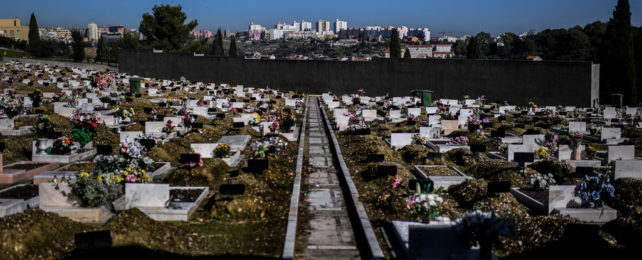A spate of human bodies mysteriously not decomposing after burial is causing a crisis in Portugal, where bodies have been observed naturally mummifying after being buried.
Under local laws implemented to save space, bodies need to be routinely exhumed so that skeletal remains can be laid to rest in smaller containers.
But many just don't decompose, causing trauma for families whose loved ones are repeatedly unearthed only to be put back to continue decaying.
A fundamental problem is that nobody really knows what happens to bodies buried in coffins.
Scientists in Portugal are now working to uncover the cause of the strange mummifications.
Grave recycling to fight overcrowding
Faced with drastic overcrowding in its cramped urban cemeteries, Portugal introduced the concept of temporary graves in the early 1960s.
The idea is simple: A decomposed body takes up less space. Bones can be packed into a smaller coffin and moved to a less spacious final resting place, like in dedicated drawers in the walls of the cemeteries.
"We don't have space to establish new cemeteries or upgrade cemeteries that already exist" in cities, said Angela Silva Bessa, a forensic anthropologist from the University of Coimbra who has been studying Portuguese cemeteries.
The bodies that refuse to rot
Three years after the burial, the deceased's family can often receive a letter warning them that the remains will need to be moved soon.
Per the law, the body can only be moved if it has decomposed so that it is just a skeleton, with no remaining soft tissue.
To check this, gravediggers have to dig up the body to look at it. If it isn't decomposed enough, it gets buried again and the process repeats every two years until it is.
A survey of cemeteries in Porto, the second largest city in Portugal, found that 55 to 64 percent of bodies between 2006 and 2015 were not fully decomposed after their first exhumation.
Paulo Carreira, funeral home owner and chief executive of the national funeral association of Portugal, told Insider that families usually deal pretty well with the first time.
But the repeated unearthings can be very emotionally damaging.
In some cases, it can take decades of repeated burial and reburial until the body reaches a final resting place, per Carreira.
And for a subset of those bodies, the process is effectively endless: They mummify.
Unlike Egyptian mummies, preserved on purpose, this happened spontaneously. Natural mummification usually happens when a body dries so quickly that decomposition simply stops. It has been observed in extreme environments like deserts or glaciers, or in intense heat and cold.
The reason it happens so much in Portuguese graves has so far proved elusive.
A quest to understand death
Silva Bessa and her colleagues have been investigating what could be slowing down the decomposition of these bodies in Portugal as part of her PhD thesis project, a first-of-its-kind study.
With the consent of the families, she has been collecting samples from bodies and the soil around them from five cemeteries.
"It's quite astonishing," she told Insider. "In the same section of the cemetery, I have different stages of decomposition."
Some bodies are fully skeletonized while others are still decomposing, she said. Others will be mummified head to toe.
"Even on the same body, I might have all the body skeletonized, the pelvis area is in putrefaction, and the hands mummified. So you can find a little bit of everything," she said.
Silva Bessa tested eight properties of the soil which might affect decomposition including temperature, acidity, moisture, density, heavy-metal contamination, and organic matter.
So far, she has yet to find a breakthrough. "I honestly thought I would at least find a relation between the soil properties and the state of the composition of the body," she said, "And I didn't."
Her next step will be to test whether substances the people took in life, like whether they smoked or took certain medicines could be a factor.
Body decomposition is still mysterious
Tristan Krap, a lecturer in forensic sciences who studies the decomposition of bodies at Maastricht University in the Netherlands, said he's not surprised that the bodies aren't decomposing fully within three years.
He said he'd expect a "normal body" in a grave to take about five years to decompose, though he admitted that was mostly guesswork.
Scientists like Krap use facilities that have access to donated bodies to study decomposition, so-called body farms.
But these tend to focus on what happens to the body above the ground, which is useful for instances like murder investigations but is less helpful for understanding regular burials.
A lot less work looks at what happens to the body after it has been buried in a grave, which is likely to be a lot more complex.
The body is like "a huge biological bomb", that introduces bacteria, tissues, and various juices into the soil, which itself has a complex ecosystem, Krap said.
One factor, Krap said, could be variations between people's bodies like overall size, muscle mass, and fat levels.
You can read more about the decomposition process here.
A lasting effect on culture, and grief
"This has a social impact, which is quite a big deal for my own country," Silva Bessa said.
Faced with the shortage of graves, people have been turning to cremation, Carreira said, and his business adapted alongside.
"Fifteen years ago, we had four crematoria. Today, we have 38," he said.
To an extent, it works – if everyone was cremated, there would be no problem.
But, as Silva Bessa noted, for the Portuguese "it's quite the tradition to bury the bodies not to cremate them." And for now, lack of space and a yawning gap in science is squeezing it out of existence.
For now, she is continuing her work, determined to find a parameter that could help.
This article was originally published by Business Insider.
More from Business Insider: